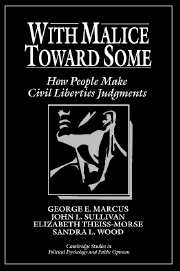Book contents
- Frontmatter
- Contents
- List of Figures and Tables
- Preface: Political Tolerance and Democratic Life
- PART I Theoretical Background and Overview
- 1 Political Tolerance and Democratic Practice
- 2 Antecedent Considerations and Contemporary Information
- 3 Thinking and Mood
- PART II Contemporary Information and Political Tolerance Judgments
- PART III Refining the Model – The Role of Antecedent Considerations as Individual Differences
- PART IV Implications and Conclusions
- Appendix A: Hypothetical Group Scenarios and Manipulations
- Appendix B: Methodological Approaches and Scales
- Notes
- References
- Index
3 - Thinking and Mood
Published online by Cambridge University Press: 05 August 2012
- Frontmatter
- Contents
- List of Figures and Tables
- Preface: Political Tolerance and Democratic Life
- PART I Theoretical Background and Overview
- 1 Political Tolerance and Democratic Practice
- 2 Antecedent Considerations and Contemporary Information
- 3 Thinking and Mood
- PART II Contemporary Information and Political Tolerance Judgments
- PART III Refining the Model – The Role of Antecedent Considerations as Individual Differences
- PART IV Implications and Conclusions
- Appendix A: Hypothetical Group Scenarios and Manipulations
- Appendix B: Methodological Approaches and Scales
- Notes
- References
- Index
Summary
When people are feeling friendly and placable, they think one sort of thing; when they are feeling angry or hostile, they think either something totally different or the same thing with a different intensity: when they feel friendly to the man who comes before them for judgment, they regard him as having done little wrong, if any; when they feel hostile, they take the opposite view.
Aristotle, The RhetoricIf, as we argued in Chapter 1, emotions influence political tolerance judgments, in spite of the long-standing hope that reason would prevail, we must take account of emotional factors. Our study must include an empirical investigation of affect if for no other reason than to better understand how reason and emotion collectively shape political judgments. But to accomplish that goal we need to have a theory that can identify which emotions matter, identify when and why they matter, and show how emotion and reason interact.
The work of a British psychologist, Jeffrey Gray, has been very influential in guiding our understanding of the functions that emotions serve (Gray, 1981,1984, 1985, 1987a, c, 1990). According to Gray's theory and research, emotions provide ongoing assessments, much as the reading provided by a thermometer tells us the temperature, or as the movement of numbers in a digital clock tells us the time. So too, Gray suggests, changes in mood report changes in ourselves and in our immediate environment.
- Type
- Chapter
- Information
- With Malice toward SomeHow People Make Civil Liberties Judgments, pp. 39 - 52Publisher: Cambridge University PressPrint publication year: 1995



